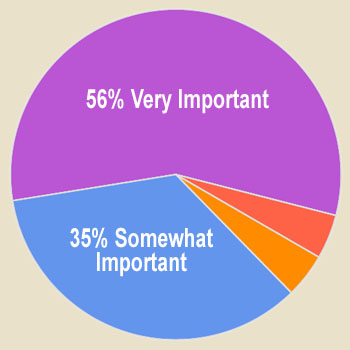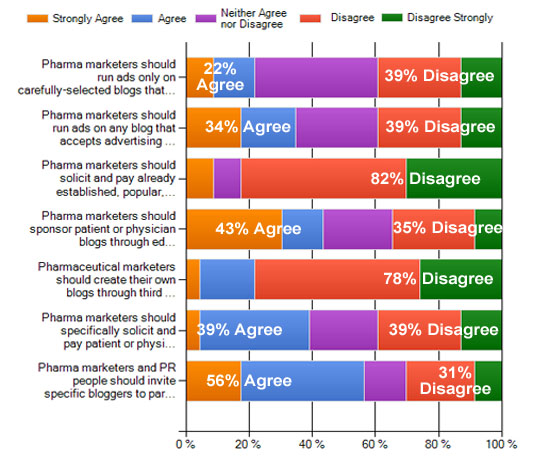Buzz ‘n Blog Survey: Customer Generated Content and Buzz Marketing
(Survey started 27 March 2006; halted 24 October 2006, re-opened 14 November 2011. N=23 respondents as of 14-Nov-2011)
![]() “Consumer Generated Content” (CGC, also known as “Customer Generated Content” or “User Generated Content,” UGC) is a current “hot” topic within pharmaceutical eMarketing circles. Many doctors and patients are bloggers and write about drugs and the conditions they treat. Many more people read these blogs every day. Therefore, it makes sense, from an online drug marketer’s point of view, to advertise on these blogs. It starts to get controversial, however, when marketers try to gain a share of voice within these venues in a more pro-active manner. This surevy solicits your opinion on specific marketing tactics involving CGC and buzz, specifically from a pharmaceutical marketing point of view.
“Consumer Generated Content” (CGC, also known as “Customer Generated Content” or “User Generated Content,” UGC) is a current “hot” topic within pharmaceutical eMarketing circles. Many doctors and patients are bloggers and write about drugs and the conditions they treat. Many more people read these blogs every day. Therefore, it makes sense, from an online drug marketer’s point of view, to advertise on these blogs. It starts to get controversial, however, when marketers try to gain a share of voice within these venues in a more pro-active manner. This surevy solicits your opinion on specific marketing tactics involving CGC and buzz, specifically from a pharmaceutical marketing point of view.
See Summary of Results and Resources & Further Reading below…
What’s your view? Take the survey and tell us. You can view up-to-date survey results plus comments after taking the survey here.
Buzz ‘n Blogs are attractive targets for advertisers not only because of the volume of participants (ie, reach; Millions of US adults read user-generated blogs, paricipate in online message boards, or listen to podcasts) but also because they think they can enlist consumers to spread their messages to other consumers. After all, poll after poll shows that consumers trust other consumers. A Neilson Buzzmetrics poll claims that consumers trust consumer opinions posted online more than they trust advertising in newspapers, magazines, TV, or radio.
Should bloggers accept advertising from companies that they may criticize in their blogs? Will that influence their opinions and change the “voice” of the blogger? It’s what I call the advertising principle of uncertainty. Bloggers are popular because of their independence from “the man” – a perceived lack of independence caused by advertising makes the blogger less independent and hence less popular. Pretty soon, advertisers will not be interested in running ads on that site.
Marketers and PR people also are tracking what consumers, physicians, pundits and critics are saying about their products and companies on blogs as well as on other CGC forums (see Resources & Further Reading). This is called Buzz Market Research, the main staple of buzz marketing firms. Pharmaceutical marketers tread the buzz waters carefully because they are obliged to report to the FDA any adverse reactions they become aware of. Nevertheless, this kind of research often is done through a third party, which puts firewalls between the pharmaceutical client and specific comments from patients and physician bloggers.
Monitoring buzz is one thing, creating it is another. It starts to get worrisome, for example, when marketers try to infiltrate the blogoshere and create content disguised as CGC or, worse, pay legitimate bloggers to create favorable content. This was a topic touched upon at a recent industry conference. It was expressed thusly: “Readers of CGC are ‘hyper-engaged’ and therefore advertisers should embrace CGC to engage their targets in new, open dialogue.” That is, jump into the conversation and “influence the influencers!”
Survey Results:
The overall results are summarized in charts below. You can view a more detailed and up-to-date online Summary of Responses plus view comments from respondents after taking the survey yourself: here.
Respondents were asked “In your opinion, how important is it for pharmaceutical marketers to monitor in a systematic manner what their customers (patients and physicians) are saying about their products on blogs and other User Generated Content Internet sites?” Possible responses are shown below. Respondents were also aked to add comments. Results to date are shown below. What’s your view? Take the survey and tell us (you can view up-to-date survey results plus comments after taking the survey here).
- Not Important at all
- Somewhat Important
- Very Important
- No Opinion

Respondents were asked to “indicate your level of agreement or disagreement with the following statements.” (Response ranges: Strongly Agree, Agree, Neither Agree Nor Disagree, Disagree, Disagree Strongly). Results to date are shown below. What’s your view? Take the survey and tell us (you can view up-to-date survey results plus comments after taking the survey here).
- Pharma marketers should run ads only on carefully-selected blogs that accept advertising (eg, blogs chosen because of their favorable industry views)
- Pharma marketers should run ads on any blog that accepts advertising regardless of blog content (ie., in the same manner that drug companies run ads in other media)
- Pharma marketers should solicit and pay already established, popular, and willing patient or physician bloggers to create favorable content (eg, product placements)
- Pharma marketers should sponsor patient or physician blogs through educational grants only (ie, no strings attached)
- Pharmaceutical marketers should create their own blogs through third parties (eg, PR or ad agencies) that pay patients or physicians to write approved content
- Pharma marketers should specifically solicit and pay patient or physician bloggers to participate in focus groups
- Pharma marketers and PR people should invite specific bloggers to participate in press conferences and other events to which established press are routinely invited

- Pharma Marketing Blog Post: “Buzz ‘n Blogs — Stealth Marketing




![6 Digital Tools at the Center of Healthcare Digitalization [INFOGRAPHIC]](http://ec2-54-175-84-28.compute-1.amazonaws.com/pharma-mkting.com/wp-content/uploads/2021/04/6DigitalTools_600px-100x70.jpg)




